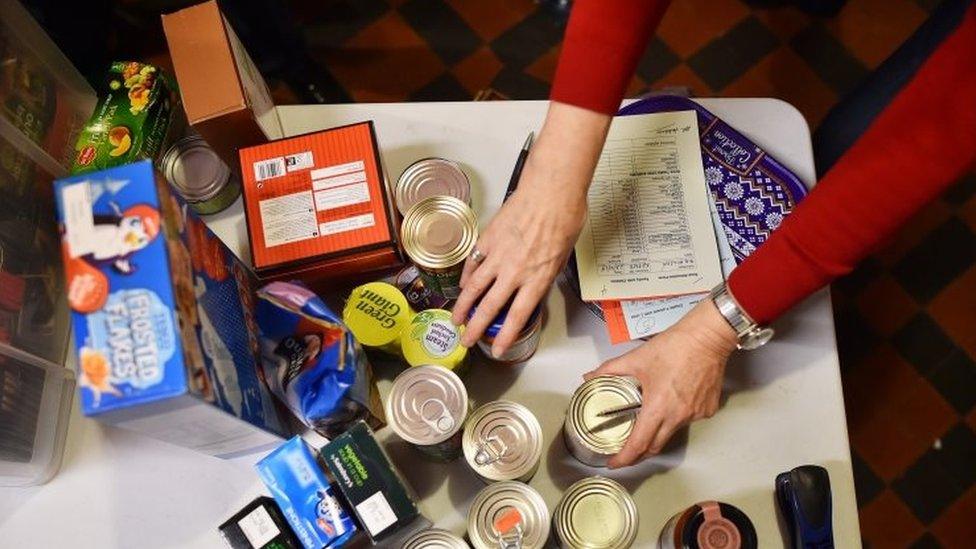Working people going hungry and can't get help, MPs told
- Published
'Hidden' working people in food poverty, MPs told
A growing number of people with "good" jobs cannot afford to feed their families and are unable to get help from food banks, MPs have been told.
Charity boss Adam Smith said people on benefits were able to get emergency food parcels and did not go hungry.
But a "hidden bracket" of working people were not entitled to do so or were ashamed to ask for help, he told the environmental audit committee.
Food bank use in the UK has been on the increase over recent years.
The Trussell Trust, the main food bank charity in the UK, says delays in benefit payments, debt and insecure employment are among the reasons that people have to turn to them for help.
People who use food banks are normally referred to them by social workers, job centres, care workers or other officials.
Mr Smith said enough was being done to support people on benefits who were in food poverty, but "the problem in this county is there is a hidden bracket of people who are suffering".
He read out an emotional testimony from an anonymous teacher, who had sought help at his organisation's "social supermarket" in Wakefield, West Yorkshire.
The woman said she had a "good job" but her wages had not gone up in a decade and the rising cost of living meant she was being forced to choose between "shopping and getting myself and my son to school".
She said she felt "so embarrassed" that she had been struggling to feed her children.
Mr Smith's charity the Real Junk Food project, runs "pay-as-you-feel" cafes and a new "social supermarket", which sell, or give away, food that had been destined for waste and has been made fit for human consumption.
Adam Smith wants to tackle the world's food waste problem with his Real Junk Food Project
Unlike food banks, anyone can use the cafes and a growing number of working people were turning to them for help, Mr Smith said.
"If we want to end hunger we need to stop feeding the poor, we need to start feeding everybody and making sure everyone has the human right to access food," he told the committee.
Anna Taylor, from the Food Foundation think tank, told the committee the government did not collect data on families who were in food poverty and had not taken the issue seriously.
According to Endhunger, a church campaign to end food poverty in the UK, as many as 8.4 million people "are living in households that struggle to put enough food on the table".
The charity is backing a bid by Labour MP Emma Lewell-Buck to force the government to monitor and annually report on food insecurity across the UK.
Her Food Insecurity Bill is supported by 150 MPs across different parties but is unlikely to become law without government backing.

Food banks

Food banks are charities that collect and distribute food to people in need
Normally, those needing help must be referred by a doctor, social worker, or Jobcentre staff, who give them a voucher to exchange for food
The food is donated by churches, businesses, community groups and individuals
The Trussell Trust - the main food bank charity - gave out 61,500 food parcels in 2010-11
By 2016-17, the number handed out by the charity had risen to almost 1.2 million